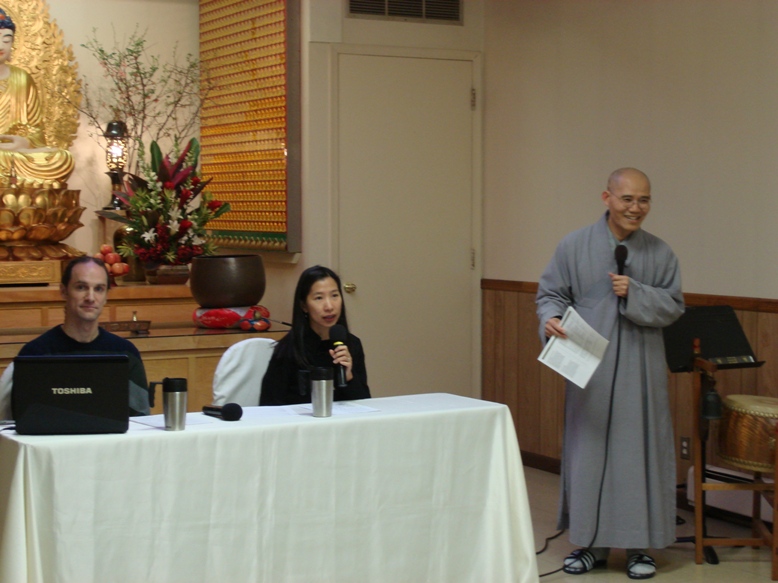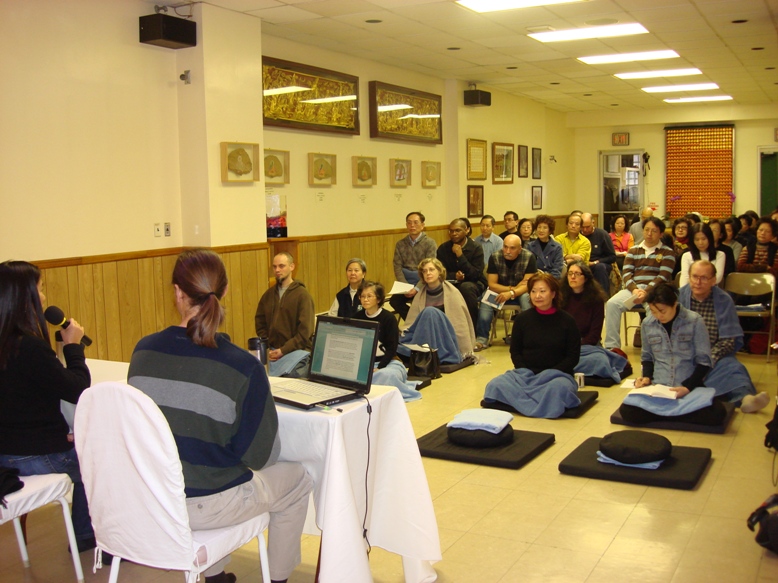| |

The Six Paramitas and the Bodhisattva Path
By Chang Jie
02/22/2009

On Sunday, February 22, 2009, Dr. David Slaymaker gave a dharma talk on "The Six Paramitas and the Bodhisattva
Path" based on the teachings of Venerable Yin-shun's, The Way to Buddhahood: Instructions from a Modern Chinese
Master and Master Sheng Yen’s booklet, The Six Paramitas.
"Paramita" is a Sanskrit word which means "attaining the other shore",
"transcendence", or "perfection". The six paramitas are giving, precepts, patience, diligence,
meditation and wisdom. According to Venerable Yin-shun, there are three gates to this practice—to generate bodhimind,
to act with kindness and compassion, and to cultivate wisdom.
There are 3 levels of generosity—giving for the sake of one's own worldly gain or benefit, giving for one's own
liberation, and the bodhisattva’s way of giving for the benefit of all sentient beings. We can give wealth, which
includes ones skills, knowledge, energy, the dharma (which may be in the form of non-Buddhist terms), and fearlessness,
which can mean appreciating someone for who they are or by listening to them.

Precepts mean conducting oneself according to Buddhist precepts. All precepts are encompassed by the 3 cumulative
pure precepts, which are:
-
1. refraining from all harm
-
2. cultivating all that is beneficial
-
3. benefiting all sentient beings
Patience means understanding and empathy. We can be patient with those who wish to
harm us, the environment (which includes our bodies, our mental habits, and aging),
and in cultivating the dharma.
Diligence is maintaining mindfulness of practice as best we can, moment by moment,
and thinking about how we can be of benefit to others. The dharma does not work
itself but we have to work the dharma, making constant, gentle effort.
Meditation is cultivating a calm, clear and concentrated mind that is in the present
moment. When the mind is scattered and excited; the mind is weak and it is difficult
to resist habits and see clearly in order to benefit others. When the mind is scattered,
we make mistakes and create suffering. When the mind is clear and concentrated, one has
energy and clarity to see the mind, and remember and apply the dharma. Meditation does
not mean just sitting meditation, but includes all activities when done with concentrated mind.

Wisdom is seeing emptiness of all things. This means recognizing that suffering is inherent in the world and seeing
self and others as one. The practice of the paramitas must be embodied in wisdom. Wisdom can be brought into our
practice in two ways--by 1) study, practice, and contemplation, and 2) meditation.
Reference:
Master Sheng Yen, The Six Paramitas (free booklet available at CMC)
Venerable Yin-shun, The Way to Buddhahood: Instructions from a Modern Chinese Master
|
|